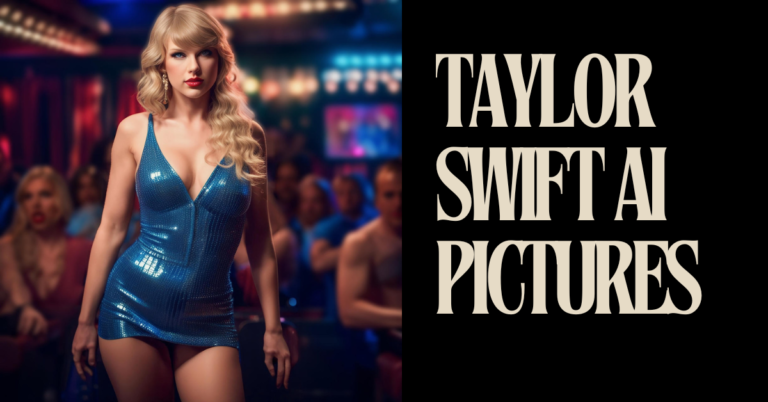In the digital age, the evolution of artificial intelligence (AI) technology has ushered in a new era of possibilities and challenges. One such challenge that recently made headlines involved AI-generated images of Taylor Swift, sparking a debate on AI ethics, privacy, and the need for regulatory frameworks. This article delves deep into the intersection of AI ethics and celebrity rights, focusing on the Taylor Swift AI pictures controversy and its broader implications.
Taylor Swift and the Emergence of AI-Generated Images
The controversy surrounding Taylor Swift and AI-generated images unfolded against the backdrop of technological advancements in AI and deep learning. These technologies have empowered AI systems to create hyper-realistic images, sometimes indistinguishable from actual photographs. However, this newfound capability also raises ethical questions, particularly regarding consent, privacy, and the potential for misuse.
The first scandal involving AI-generated images of Taylor Swift occurred when unauthorized images depicting her in explicit and suggestive scenarios surfaced online. These images, accompanied by misleading captions and manipulative narratives, not only invaded Swift’s privacy but also perpetuated harmful and objectifying content.
The emergence of these images triggered a swift response from Swift’s legal team and dedicated fan base, leading to the shutdown of the platforms hosting these unauthorized creations. However, the incident served as a wake-up call regarding the vulnerabilities and risks associated with AI-generated content.
Antonio Brown’s Controversial Post and the Continuing Debate
The recent controversy involving Antonio Brown sharing an AI-generated photo of himself and Taylor Swift further reignited the debate on AI ethics and celebrity rights. While the image was not as explicit as the previous scandal, it still raised concerns about the misuse of AI technology to create misleading or non-consensual content.
Brown’s actions sparked public outrage and discussions about the ethical boundaries of AI-generated content. The incident highlighted the need for stricter regulations and accountability measures to prevent the unauthorized creation and dissemination of AI-generated images, especially when they involve public figures and celebrities.
Public Outcry and Calls for Regulation
The public outcry in response to the Taylor Swift AI pictures controversy reverberated across social media platforms, news outlets, and advocacy groups. Fans, industry professionals, and organizations like Sag-Aftra voiced their concerns about the potential harm caused by AI-generated content that violates individuals’ privacy and dignity.
The incident prompted calls for legislative action to address the ethical and legal challenges posed by AI technology. The United States government, including the White House, expressed alarm over the unauthorized use of AI to create deceptive or offensive content. This renewed attention underscored the pressing need for comprehensive AI regulation frameworks that uphold ethical standards and protect individuals’ rights.
The Complexity of Regulating AI: Balancing Innovation and Ethics
Regulating AI presents a complex challenge due to its rapid evolution, cross-border nature, and diverse applications. Legislators face the daunting task of striking a balance between fostering AI innovation and safeguarding against its potential misuse. Key considerations in AI regulation include:
- Consent and Privacy: Ensuring that AI-generated content respects individuals’ consent and privacy rights, especially in cases involving public figures or sensitive contexts.
- Transparency and Accountability: Implementing transparency measures to disclose the use of AI in content creation and holding accountable those responsible for unethical or harmful AI applications.
- Fair Use and Intellectual Property: Addressing issues of intellectual property rights, fair use, and attribution in AI-generated content to prevent unauthorized exploitation or misrepresentation.
- Cross-Border Collaboration: Facilitating international cooperation and standards to regulate AI practices effectively across jurisdictions and mitigate global risks.
Celebrity Influence and Social Change
The Taylor Swift AI pictures controversy exemplifies the influential role of celebrities in driving conversations about technology, ethics, and societal norms. Celebrities like Swift can leverage their platforms to raise awareness, advocate for change, and hold accountable those responsible for unethical or harmful practices.
Swift’s proactive response to the unauthorized AI-generated images, coupled with her legal team’s efforts, reflects a broader trend of celebrities asserting their rights and pushing back against invasive digital practices. Their actions contribute to shaping public discourse, influencing policy decisions, and fostering a culture of digital responsibility.
The Future of AI Ethics and Regulation
As AI technology continues to advance, the dialogue on AI ethics and regulation will remain critical. The Taylor Swift AI pictures controversy serves as a cautionary tale and catalyst for meaningful change in how AI-generated content is created, shared, and regulated.
Moving forward, stakeholders must collaborate across sectors – including government, tech companies, advocacy groups, and the public – to develop robust AI governance frameworks. These frameworks should prioritize ethical guidelines, user protection, transparency, and accountability to ensure that AI serves society’s best interests while respecting individual rights and values.
Conclusion
In conclusion, the Taylor Swift AI pictures controversy underscores the complex intersection of AI, ethics, and celebrity rights. It prompts us to reflect on the ethical responsibilities inherent in AI development and usage and reinforces the urgent need for comprehensive AI regulation that upholds fundamental principles of privacy, consent, and integrity. As we navigate the evolving landscape of AI technology, ethical considerations must remain at the forefront of our discussions and actions.
Top of Form

